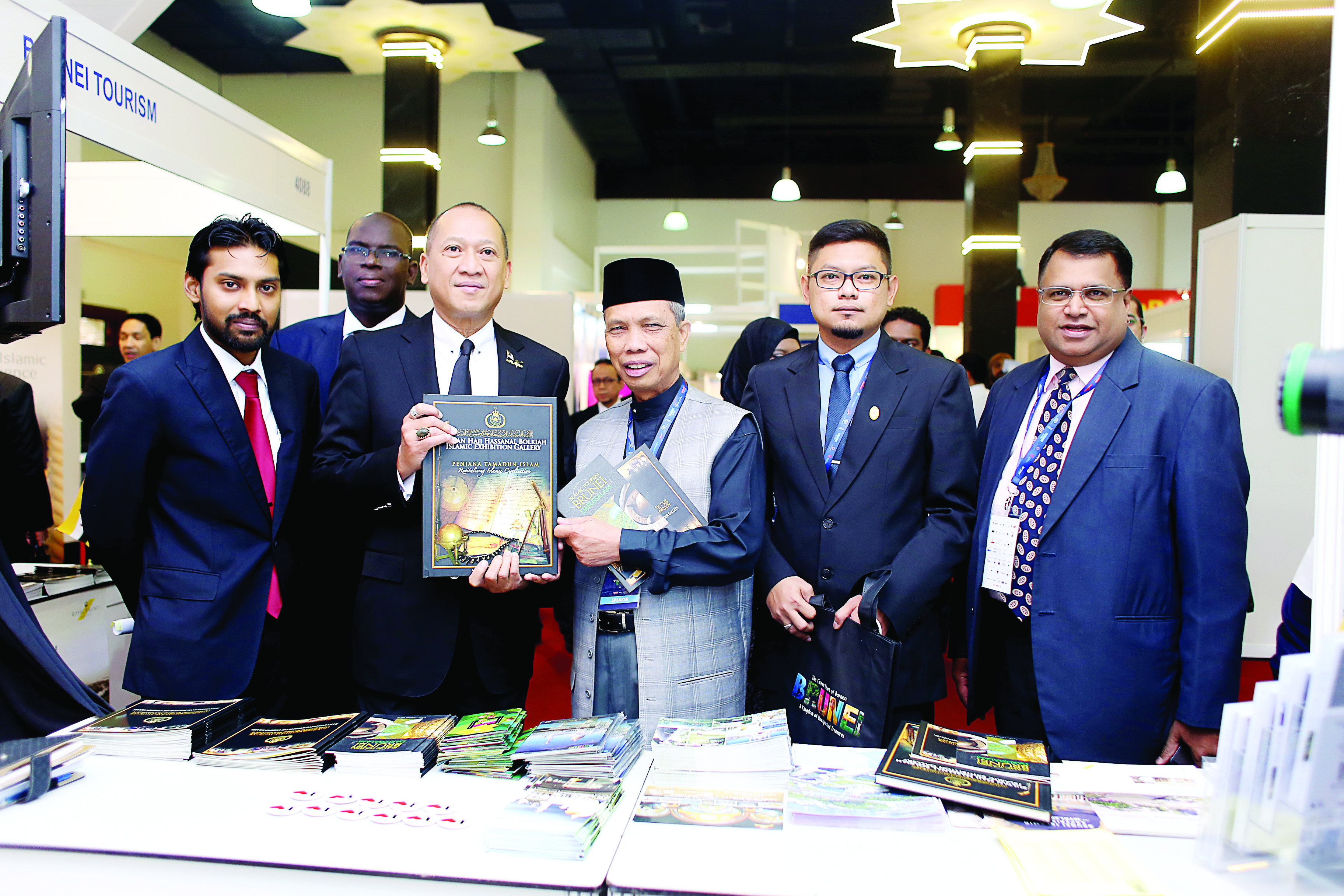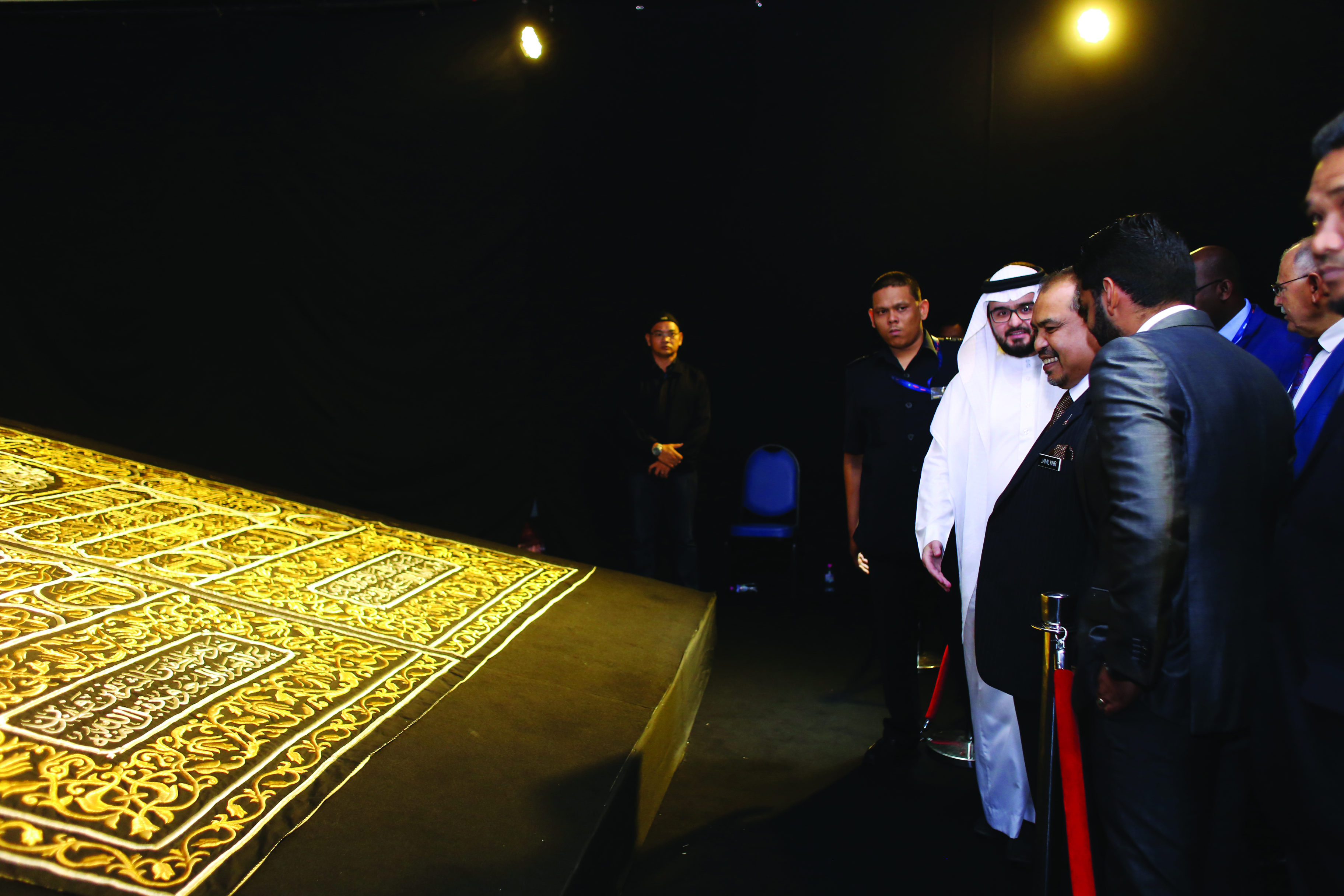
Muhammad Raja Talib Bin Dato’ Dr. Raja Mohamad Abdullah CEO, OIC International Business Centre & Dr. Raja Laila Rani Binti Dato’ Dr. Raja Mohamad Abdullah Editor-In-Chief, OIC TODAY Magazine
■ Can you tell us the primary focus of The Muslim World BIZ?
In 2010, our late father Dato’ Dr. Raja Mohamad Abdullah envisioned this event as a platform that brings together all stakeholders of the Islamic economy including government officials, business leaders and professionals, entrepreneurs, and academicians from the 57 member countries of the Organisation of Islamic Cooperation (OIC) and beyond. The primary focus of the Muslim World Business and Investment Zone has been to increase trade collaborations between the Muslim countries and at the same time it aims to bridge the gaps between the Muslim countries and the rest of the world.
As Muslims – and this has been proven by recent scientific research –, we believe that all means for success are available in the Islamic system of economy and trade and that it is the best system which is suitable everywhere anytime. However, the challenge facing the progress of the Islamic economy lies in two main areas. The first of which is the difficulty of deriving the real principles of the system from the authentic sources of Islam while the second is putting these principles to work. The Muslim World BIZ, therefore, has the objective of facilitating both challenges.
We have five specialised conferences where existing practices are tested and new strategies are developed to improve different elements of the economy including trade and investment, education, Islamic tourism, medical tourism in addition to leadership skills. Apart from this, change of experience and initiation of partnerships take place in the exhibition zone and during business matching sessions along the days of the event every year.
The significance of the year’s theme “Turning Visions into Realities” is that after six years of successful organisation where the basic foundations of long term cooperation have been established, we believe it is time to focus more on accomplishing the visions of our participants which accumulatively fulfil the vision of the Islamic economy at large. In fact, we now have a community of participants who are interconnected through partnerships for mutual benefits.
■ What are some of the benefits exhibitors and participants can expect at The 7th Muslim World BIZ 2016?
The Muslim World BIZ acts as a platform for interconnectedness and cooperation between the participating organisations and individuals for the accomplishment of their own goals which we believe contribute to the development of their national economies, and this in turns help developing the Islamic and the global economy alike. We believe in the importance of integration and collaboration.
In this regards, we constantly work on improving the services we provide to the participating individuals and organisations by listening to their suggestions and observing the actual deliberations and transactions during the event so that we can add or modify certain activities. Business matching is one of the most important activities where we invite trade sellers and buyers to one-to-one discussions which normally end by signing MoUs and partnership agreements.
I will give you one example from the higher education sector. This year, for the first time, we have invited representatives of the “Programme Accreditation and Certification Equivalency” units at the education ministries of several OIC member countries. This was requested by a number of the participating higher education institutions as they face difficulties marketing their programmes if your do not have the necessary accreditation. By doing so, we maximise the benefits to include students in addition to the educational institutions themselves.
■ Being organised for the 7th time, what are the highlights of the event compared to the previous exhibitions?
If you follow the history of The Muslim World BIZ over the past six years, you can notice the progress and development of the various activities and highlights before, during and after the event. For example, we started with only one conference and then year after year we added new conference – the last of which is World Medical Tourism Exhibition and Conference which we introduce this year for the first time. The introduction of new services which we have given example about answering your previous question is another example.
Last year, the main highlight was the presentation of the original Kiswah of the Kaa’bah (the cover of the Holy building in Mecca) in the exhibition hall. The message which we tried to send then was directed to the unity of the Ummah (Muslim nation), solidarity and acceptance of the others. This year, we will have new activities which we prefer not to reveal now but you will observe from 18-22 October 2016. However, we can share with you that the scope of participation, especially from non-Muslim countries – such as China, South Korea, Philippines and Singapore – has increased this year. Perhaps one reason for that is their increasing interest in the Halal markets.
■ It seems that your engagement in the issues pertaining to the Islamic economy started quite some time before the first Muslim World BIZ was organised. This appeared in the publication of OIC TODAY magazine. Could you briefly tell us the history and objectives of this magazine?
That is right. OIC TODAY magazine was established in 2003 to disseminate information about investment opportunities and business best practices in the 57 OIC member countries. The main objective was to contribute significantly to the efforts which the OIC has started in the beginning of the new millennium to introduce and promote the Islamic economy as a solution to the financial problems facing the global economy nowadays. We have taken essential part in this task and along the years the readership of OIC TODAY increased in numbers and impact.
In the magazine we have different sections ranging from light and brief pieces of news to deep analyses. We also discuss past practices and present future prospects in various topics. In every issue, we feature one of the OIC members in a special section called “Country Focus.” We also have special features according to several occasions happening around the Muslim world. Since the Muslim World BIZ was established, OIC TODAY has been honouring the prestigious award “Jewels of the Muslim World,” which we believe is another addition to the magazine’s contribution to the Islamic economy.
■ Can you explain briefly on what ‘Jewels of the Muslim World Award 2016’ is about and who can participate in the awards?
In events like the Muslim World BIZ, with the objectives which we mentioned earlier, it is best to give practical examples of successful people and organisations to inspire and motivate others to work and have hope for the future. Therefore the incorporation of this award happened directly after the first year. There are certain criteria which a special committee follow to nominate and select the award winners. The most important element is the contribution the nominated individual has to the development of the Islamic economy by achieving success for themselves and their respective countries.
The award presentation itself has developed over the years. For the first two years, the winner will receive it during the opening ceremony of the Muslim World BIZ. But then we realised that there will be more benefits for the participants to listen to those “jewels” sharing their stories of success and this is where we incorporated the Round Table Talk. So far, we have awarded 43 jewels from many corners of the Muslim world and this year we are preparing to award the next batch of jewels on the 19th of October.
■ The Round Table Talk – Jewels Of The Muslim World conference, with the Theme “Leaders of Islamic Economy – Inspiring Actions” sounds promising. What does this conference aim to achieve?
As we mentioned the incorporation of the Round Table Talk (RTT) was to find an avenue where the winners of the Jewels of the Muslim World Award can share their experience with selected category of delegates who are mainly ambitious entrepreneurs and top students in their respective universities. This summit is designed as a global leadership programme where the traditional business practices are mixed with innovative initiatives using modern approaches.
The theme selected for this year “Leaders of the Islamic Economy – Inspiring Actions” goes in line with this general scope of the RTT. New and previous recipients of the award are the panellist speakers in the 4 different sessions. Nurturing a new generation of great leaders is the main aim of the RTT. It is indeed a programme that we are proud of and we look forward to see the outcomes this year and in the future.
■ As a progressive Muslim country with consistent economic development and growth rate as well as political and social stability, Malaysia is considered the leader in the world’s Halal industry. How is the Muslim World BIZ helping to create better awareness and increase better public participation on this?
Referring to two of your earlier questions related to the benefits, we offer the participants and the significance of choosing Malaysia to host the Muslim World BIZ. Actually, the increasing number of non-Muslim countries that are tapping into the Halal market impels us to put more effort in creating awareness about the procedure through which products and services are certified.
It is actually more of a responsibility than a choice, and this responsibility increases with the widening definition and scope of Halal to include financial transactions, lifestyle products, logistics, etc.
■ As the Chairman of the Muslim World BIZ and CEO of OIC International Business Centre, what is your plan to bring Halal opportunities and the Muslim World BIZ forward in the coming years?
Our current focus is to introduce the Halal products and services to the world, and we can see that the demand for these products and services increase exponentially. Consequently, our emphasis in the coming years will be on ensuring that whenever a country chooses to adopts the Halal approach, then the implementation of its various process comply with the teachings of Islam. In Malaysia we have a somehow long experience in helping other neighbouring countries such as China, Korea and Japan in establishing and implementing their own Halal certification programmes.
In fact, our own Muslim countries need to pay a close attention to the products and services consumed by their people. In fact many countries in the Middle East do not have such programmes thinking it is not required in their contexts. However, we all know that just by having certain products prepared by Muslims in a Muslim country does not mean these products fulfil the Halal requirements. Our personal aspiration in this regard is to establish a universal Halal certification programme which can be used anywhere. And this will facilitate the process of entering new markets which may require different procedure for Halal certification than others.
■ How can franchising, especially the F&B sector capitalise on the opportunities available in the Halal market?
The F&B sector represents a very important facet of the economy in most countries. It has gained more importance as the policies of international trade developed over the past few years due to globalisation. Because Halal certification procedure is not easy to be understood and implemented in non-Muslim countries, franchise can be a viable option to market Halal products and services to various markets. A company whose products are certified for Halal can transfer its expertise and production guidelines to other companies which can then produce and market them in other places. This may, however, require coordination with, and endorsement by, governments and policy makers. The number of companies that franchise their products is increasing, especially in the F&B sector in addition to the banking and financial sectors.









